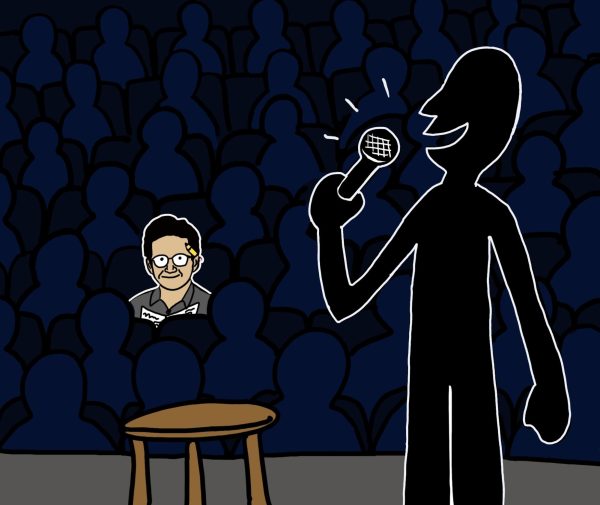Harrison Ford carries new comedy-drama ‘Shrinking’
March 15, 2023
If you expect the new Apple TV+ show Shrinking to reach the same peaks as some of its Apple predecessors, your opinion of the show will be negative. However, if you separate it from those and let it be a sitcom that can be profound in its own right, an entertaining show but not a magnificent one by any means, you will enjoy it.
The first episode of Shrinking was released on Jan. 27 to Apple TV+ subscribers. The comedy-drama, which leans more toward comedy than drama, was created by Bill Lawrence, Brett Goldstein and Jason Segel. When the show was announced in Oct. 2021, the star power in it was evident, even looking solely at its writers. Goldstein and Lawrence worked on Ted Lasso, the former playing Roy Kent in addition to his writing duties.
Shrinking follows therapist Jimmy Laird (Segel), a year removed from the death of his wife, Tia (Lilan Bowden). Jimmy has been treading water since the car crash that caused her passing. Jimmy grapples with his mental health issues, even as a therapist. His work struggles because he is struggling. This leads him to become burned out and disillusioned with the profession. After one challenging day, Jimmy snaps and drops all professional courtesy to tell his clients what he really thinks of their situations.
Throughout all of this, colleagues Dr. Paul Rhodes (Harrison Ford) and Gaby (Jessica Williams) deal with their own problems while trying to avoid the side effects of Jimmy’s. For Paul, it is a Parkinson’s diagnosis, and for Gaby, it is her dysfunctional marriage. Ford’s performance as Paul is superb, and it feels like he had more fun being curmudgeonly as Paul than he has had fun in any of his other roles. Ford is hilarious in Shrinking, yet he maintains a level of seriousness that makes his problems relatable.
Thanks in no small part to Ford, the problems each character faces in the show are one of the preeminent things about it. Each issue is realistic, and they all feel like genuine challenges people face in real life. They give basic ways to connect to the characters and give them incredible depth by showing how everyone deals with their issues.
While many of the connections on screen ring true, Jimmy’s relationship with his daughter, Alice (Lukita Maxwell), is a weak spot for the show. The viewer enters into a world in which both Jimmy and Alice have been grieving the loss of Tia, with Jimmy having failed to be there for his daughter during this difficult time, leaving her to fend for herself. At an emotional high point in the episode’s pilot, she reminds Jimmy that she “lost her too, you know.”
Alice and Jimmy’s connection is not well-fleshed out. It shows a fractured relationship, with the cracks supposedly existing for a year. The timeline is the most perplexing thing to grasp in this case. The viewer is supposed to believe that these two could live in the same household, cold and uncaring, without having blown up at each other for an entire year. For a show that is so frequently rooted in realism, the relationship between Jimmy and Alice is something it gets wrong.
Still, the star-studded cast and the overlap in crew between other hit Apple TV+ shows lends Shrinking to be compared to them. However, comparing Shrinking to other hits such as Ted Lasso and Severance would do a disservice to the show. If you watch the series expecting it to contain the edge-of-your-seat suspense of Severance or the almost child-like humor from Ted Lasso, you will be disappointed. The show truly comes into its own when separated from its most clear counterparts and instead is compared to another Apple TV+ show, The Shrink Next Door.
Both shows tackle a central theme of therapy, albeit with vastly differing plots. The Shrink Next Door is much darker than Shrinking ever gets, but both shows convey the world of mental health while toeing the line between acceptable and objectionable. The shows end up very similar, and Shrinking shines in the comparison because of its humor.
To put it simply, Shrinking is hilariously cynical. Like its main character, the comedy is rather candid. This gives the show a charm, an unmistakably human quality that makes it easy to become attached. Every time there is a joke, you are left wondering whether this will be the point the show goes over the edge into offensive territory, but it never goes beyond that, allowing it to maintain a broad appeal.
The show does contain several faults, however. Often, comedy gets in the way of emotional moments reaching their full potential. When there are jokes all the time, they get in the way of the story, and in Shrinking, they, unfortunately, get in the way a fair bit. It is the best part of the show but also the bit that holds it back from being truly great.
While Shrinking doesn’t hit the same emotional highs as the best shows out there, it manages to do the best thing a TV show can by being enjoyable to watch. When watching the show, you will stumble across a message that feels simple in concept, after all, it is a show about therapy. That message paraphrases the adage that goes ‘be kind, for everyone you know is fighting a hard battle.’ The idea is that even your therapist will go through tough times, and portraying that is what the show does best.





















